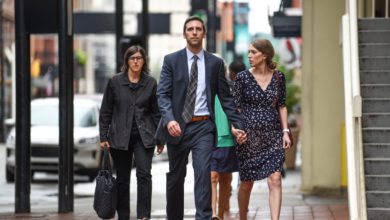
President Joe Biden on Wednesday is set to promote the newly launched Restaurant Revitalization Fund, which was established to help struggling restaurants and other eligible businesses keep their doors open during the coronavirus pandemic, according to a White House official.Applications for the program opened on Monday. The $28.6 billion fund was established as part of the $1.9 trillion COVID-19 relief bill the president signed into law earlier this year.The president will provide an update on his administration's implementation of that law, which was Biden's first and most pressing legislative priority since taking office, in the State Dining Room at the White House.On Wednesday morning, Biden visited Taqueria Las Gemelas, a restaurant in Northeast Washington, D.C., that he says was the first restaurant in the country to receive funds from the Restaurant Revitalization Fund. He said the restaurant received $677,000 from the program.The president spoke with employees and picked up lunch, joking about how on the campaign trail his staff would sometimes eat tacos he was saving for himself. According to the White House, 186,200 restaurants, bars, and other eligible businesses in all 50 states, Washington, D.C., and five U.S. territories applied for relief through the Restaurant Revitalization Fund.The Restaurant Revitalization Fund will provide restaurants with up to $10 million per business in funding to match their pandemic-related revenue losses, with no more than $5 million per physical location, according to the Small Business Administration. The minimum award is $1,000.The SBA will prioritize funding applications from small businesses owned and run by women, veterans and socially and economically disadvantaged individuals for the first 21 days of the program, according to the White House. After those initial 21 days, the applications will work on a first-come, first-served basis.Funds from the program may be used for costs related to the business including payroll costs, payments on any mortgage obligation, rent payments, debt service, utility payments, maintenance expenses, construction of outdoor seating, supplies and other expenses.Those who receive the funds do not have to repay the money as long as they are used for eligible expenses no later than March 11, 2023.Businesses eligible for the funding include restaurants, food trucks, caterers, bars, bakeries, breweries, wineries, inns and others.The Biden administration has stressed that equity is at the center of their response to the coronavirus pandemic and has focused on communities and Americans hardest-hit by the pandemic and the economic fallout.The Independent Restaurant Coalition, a group formed during the pandemic to advocate for struggling independent restaurants and bars nationwide, has been pushing for a much-larger $120 billion restaurant revitalization fund.The group says the pandemic has cost restaurants and bars more than $219 billion in sales and that they have received less than $24 billion in the first round of Paycheck Protection Program loans."The overwhelming demand for this fund makes clear that restaurants and bars are hurting," Erika Polmar, executive director of the Independent Restaurant Coalition, told CNN.Polmar said: "The SBA and the Biden Administration left no detail to chance in building this program and we are grateful they implemented this program quickly and took our concerns seriously to allow the businesses hurting the most to access the relief they desperately need."The COVID-19 economic relief law included $1,400 stimulus checks to Americans, unemployment assistance, aid to states and municipalities, nutrition assistance, housing aid, tax credits for families and workers, funding for optional paid sick and family leave, health insurance subsidies and Medicaid, more money for small businesses and more.Shortly after signing the COVID-19 economic relief legislation into law, Biden announced Gene Sperling, a former top economic official in the last two Democratic presidential administrations, would serve as the coordinator overseeing the implementation of the law.The Treasury Department also established an Office of Recovery Programs to work closely with Sperling and lead the agency's implementation of economic relief measures from the three massive congressional coronavirus relief bills. The office is led by Jacob Leibenluft.Now Biden is focused on passing his next legislative priority: roughly $4 trillion in investments focused on infrastructure, education, child care and paid family leave.
President Joe Biden on Wednesday is set to promote the newly launched Restaurant Revitalization Fund, which was established to help struggling restaurants and other eligible businesses keep their doors open during the coronavirus pandemic, according to a White House official.
Applications for the program opened on Monday. The $28.6 billion fund was established as part of the $1.9 trillion COVID-19 relief bill the president signed into law earlier this year.
The president will provide an update on his administration's implementation of that law, which was Biden's first and most pressing legislative priority since taking office, in the State Dining Room at the White House.
On Wednesday morning, Biden visited Taqueria Las Gemelas, a restaurant in Northeast Washington, D.C., that he says was the first restaurant in the country to receive funds from the Restaurant Revitalization Fund. He said the restaurant received $677,000 from the program.
The president spoke with employees and picked up lunch, joking about how on the campaign trail his staff would sometimes eat tacos he was saving for himself.
According to the White House, 186,200 restaurants, bars, and other eligible businesses in all 50 states, Washington, D.C., and five U.S. territories applied for relief through the Restaurant Revitalization Fund.
The Restaurant Revitalization Fund will provide restaurants with up to $10 million per business in funding to match their pandemic-related revenue losses, with no more than $5 million per physical location, according to the Small Business Administration. The minimum award is $1,000.
The SBA will prioritize funding applications from small businesses owned and run by women, veterans and socially and economically disadvantaged individuals for the first 21 days of the program, according to the White House. After those initial 21 days, the applications will work on a first-come, first-served basis.
Funds from the program may be used for costs related to the business including payroll costs, payments on any mortgage obligation, rent payments, debt service, utility payments, maintenance expenses, construction of outdoor seating, supplies and other expenses.
Those who receive the funds do not have to repay the money as long as they are used for eligible expenses no later than March 11, 2023.
Businesses eligible for the funding include restaurants, food trucks, caterers, bars, bakeries, breweries, wineries, inns and others.
The Biden administration has stressed that equity is at the center of their response to the coronavirus pandemic and has focused on communities and Americans hardest-hit by the pandemic and the economic fallout.
The Independent Restaurant Coalition, a group formed during the pandemic to advocate for struggling independent restaurants and bars nationwide, has been pushing for a much-larger $120 billion restaurant revitalization fund.
The group says the pandemic has cost restaurants and bars more than $219 billion in sales and that they have received less than $24 billion in the first round of Paycheck Protection Program loans.
"The overwhelming demand for this fund makes clear that restaurants and bars are hurting," Erika Polmar, executive director of the Independent Restaurant Coalition, told CNN.
Polmar said: "The SBA and the Biden Administration left no detail to chance in building this program and we are grateful they implemented this program quickly and took our concerns seriously to allow the businesses hurting the most to access the relief they desperately need."
The COVID-19 economic relief law included $1,400 stimulus checks to Americans, unemployment assistance, aid to states and municipalities, nutrition assistance, housing aid, tax credits for families and workers, funding for optional paid sick and family leave, health insurance subsidies and Medicaid, more money for small businesses and more.
Shortly after signing the COVID-19 economic relief legislation into law, Biden announced Gene Sperling, a former top economic official in the last two Democratic presidential administrations, would serve as the coordinator overseeing the implementation of the law.
The Treasury Department also established an Office of Recovery Programs to work closely with Sperling and lead the agency's implementation of economic relief measures from the three massive congressional coronavirus relief bills. The office is led by Jacob Leibenluft.
Now Biden is focused on passing his next legislative priority: roughly $4 trillion in investments focused on infrastructure, education, child care and paid family leave.
Source link










